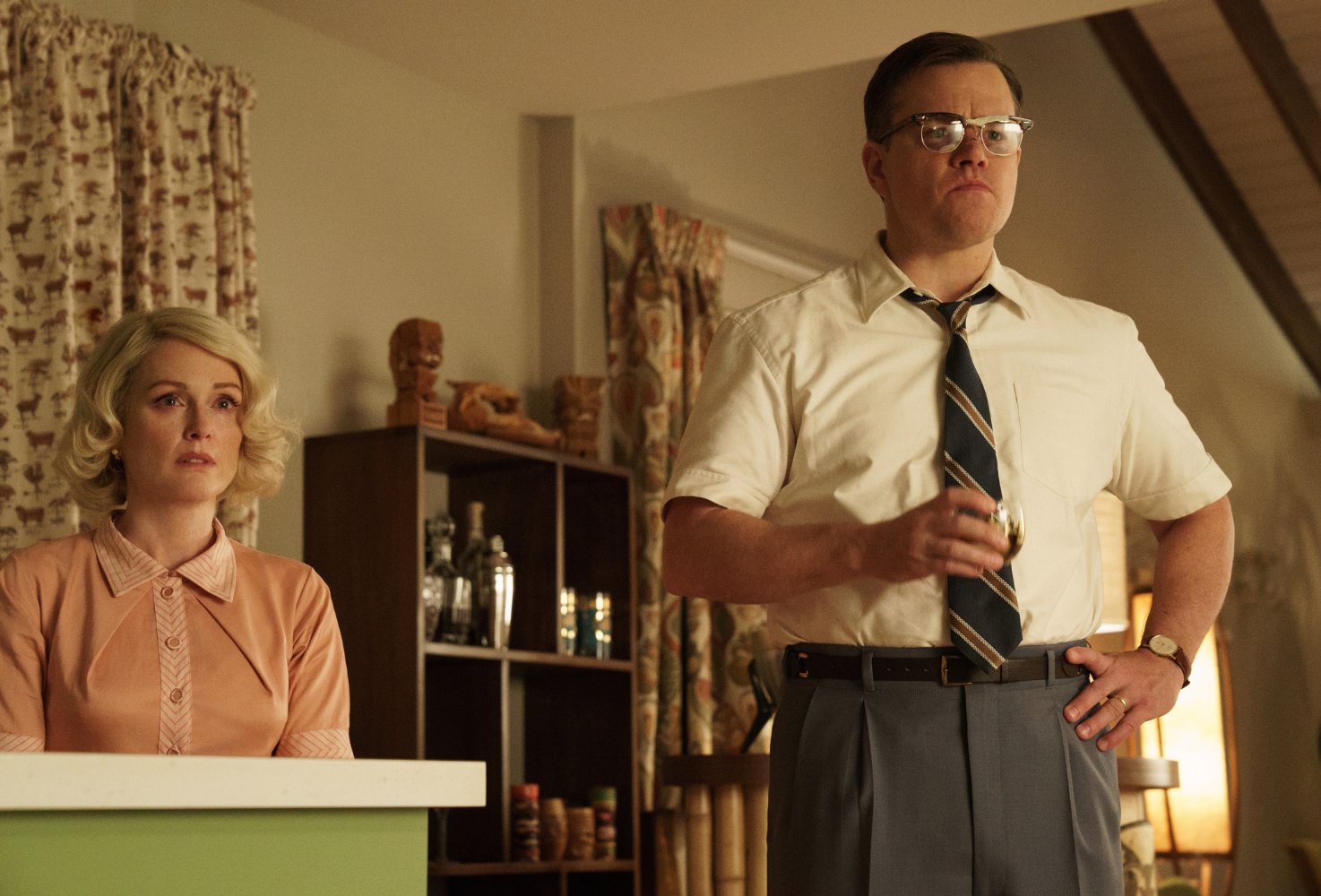Suburbicon isn’t quite sure about anything. In its desire to be both a ‘Very Important Film’ and a Coen-esque comedy it misses both marks and goes flying off into the middle distance. While the film started it’s life as an old Coen brothers script, George Clooney and Grant Heslov share the screenwriting credits and the cracks between the two stories are as wide as a canyon. The acting is well done and production design is gorgeous, but those are just about the only thing that works in this mish-mash of a film.
The film opens with a 50s-style advertisement for a planned community, Suburbicon: a place that claims to have everything you could ever need. Then we are introduced to the Mayers, a new family in the neighborhood, who turn out to be the first black family to move into Suburbicon. Within minutes it becomes apparent that while the advertising has made some bold claims, what it is offering is only for white people. After this point is made, focus abruptly switches over to the Lodges, who live behind the Mayers and are one of the only families who seem not to care about their new neighbors’ arrival. The family is made up of Gardner (Matt Damon), his paraplegic wife Rose (Julianne Moore), their son Nicky (Noah Jupe), and Rose’s sister Margaret (also Julianne Moore), who is a regular visitor. Late one night, two men break into their house and Rose is killed via chloroform at the hands of the intruders, and Nicky is the only one who sees that it is done on purpose.
When the police conduct their investigation Nicky discovers that something about the situation is off and he begins to watch his father and aunt very closely. As the truth of the murder comes to light, the family’s lives devolve into outbursts of violence that are meant to be shocking, but quickly turn tiresome. These scenes alternate with shots of an ominous crowd of harassers and thugs gathering outside of the Mayers house in a growing mob that attempts to intimidate the new family into leaving. As each story draws towards it’s inevitable conclusion they grow farther and farther apart until the final climactic moments that only serve to highlight the stupidity of juxtaposing a violent screwball comedy with a horrific act of racist terrorism.
Matt Damon and Julianne Moore both hold on to their usual comedic sensibilities and rise above the material they are provided here. Noah Jupe gives the best performance of the film as he is the only person in a main role who is given no comedic lines. He reacts to all of the situations in a natural way that provides some small measure of stability in a film that goes wildly off the rails. For all of that, Oscar Isaac is the most fun to watch in his few scenes as the suave and suspicious insurance adjuster who has come to investigate the death of Rose. His smarmy cleverness fits right into the comedic stylings on display and adds an element of uncertainty to a predictable film.
Suburbicon is a strange mix of murder mystery, outlandish comedy, and a flimsy civil rights commentary, but none of it lands the way the film wants it to. While the rest of the town is obsessing about the damage a family of color can bring to their seemingly peaceful suburb, the true horror is happening next door and is being committed by the supposedly wholesome white family. The film is trying to say so much with this positioning, but it all falls flat. Most of the focus is put on the story of the Lodges, who are fully developed characters with emotional depth and plausible motivations. None of the black characters are given any dimensions beyond being nice people; we never see them express anger or outrage at their mistreatment, or really any emotions except fear. The Mayers storyline floats in the background with a vague sense of importance that comes across as yet another example of using the mistreatment of people of color as a lesson for white audiences.
It’s a shame that Suburbicon fails so utterly at its goals, as the seeds of a good story are there and the comedic depths available to the original story are considerable. It is the choice to tell two such disparate stories with little connection and the distinct lack of effort made to develop the Mayers family beyond the limited role they were allotted that makes the film so unenjoyable.













